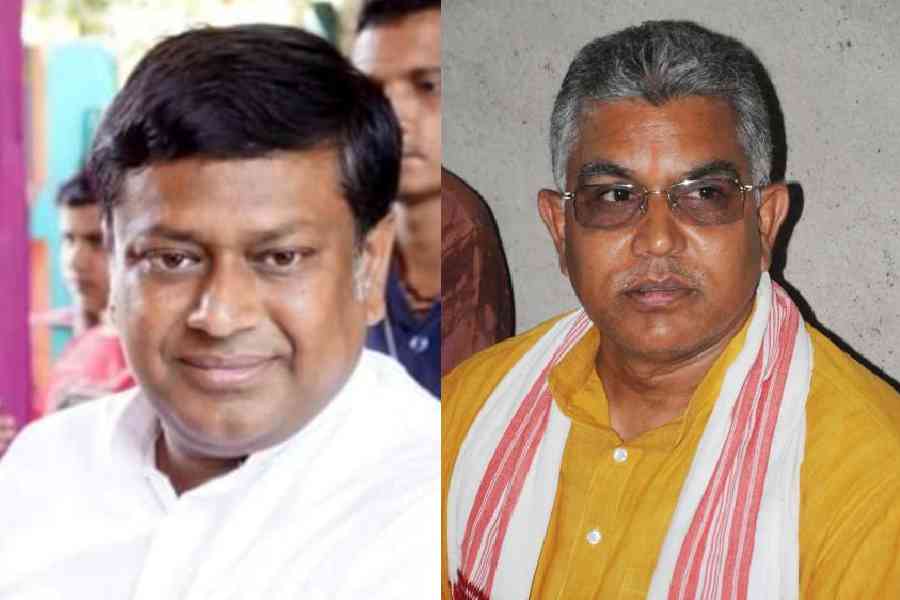A two-day coordination meeting between the BJP and all frontal organisations of the RSS ended on Saturday in Howrah’s Uluberia, with the resolve to work together in Bengal by bridging differences within the saffron ecosystem ahead of the 2026 Assembly elections.
A source in the BJP said that although there was no direct connection between the election and the coordination meeting, the event assumes significance as the lack of coordination between the BJP and its ideological mentor RSS emerged as a challenge in Bengal in the 2024 general election when the party won 12 seats, six fewer than in 2019.
“The coordination meeting was part of a nationwide drive that began at the national-level conference in Kerala’s Palakkad in August last year. However, the timing of the meeting in Bengal is very significant, as the Trinamool Congress has already sounded the bugle for the Assembly elections next year,” said a senior BJP leader.
The two-day meeting was organised after RSS chief Mohan Bhagwat spent 10 days in Bengal last month, culminating in a mega public rally in East Burdwan’s Talit, where he urged the people of the state to join and observe the Sangh Parivar from
the inside.
“The meeting will help significantly in building a stronger cadre base for the RSS in Bengal, which is crucial ahead of next year’s election,” said a source in the RSS.
Representatives of all 27 frontal organisations of the RSS, along with top BJP leaders — including state president and junior Union minister Sukanta Majumdar, leader of the Opposition Suvendu Adhikari, and former Bengal party chief Dilip Ghosh — participated in the meeting.
They not only discussed various issues related to promoting the ideology of the saffron ecosystem but also spent two days together, sharing meals and setting aside internal factional differences within the party.
A BJP leader noted that in Bengal the meeting was particularly important in bringing all senior leaders together under one platform to send a message that the BJP and Sangh Parivar wanted a collective effort in Bengal.
“You may find that many top BJP leaders are often preoccupied with their followers and in different issues factional disputes become so prominent that they lead to conflicting statements in the media. However, during the two-day coordination conference, there were no distinctions between senior and junior members or big and small leaders. Everyone was treated equally. This meeting not only helped bridge the gap between the RSS and BJP but also reduced internal differences among BJP leaders in Bengal,” said a party insider.
According to him, the BJP’s inability to establish a significant electoral foothold in Bengal stemmed from its failure to unite all frontal organisations under a common vision to capture the state.
“The party and the Sangh Parivar do not want to repeat past mistakes. While coordination meetings are not new, their significance in Bengal is entirely different,” he added.
A source said that the BJP began wooing back its ideological mentor, the RSS, after top party leaders realised that the BJP’s underperformance in last year’s Lok Sabha election in Bengal, was due to a lack of support from the saffron ecosystem, particularly the Sangh Parivar.
“The impact of the coordination meeting between the BJP and RSS became evident after the Delhi election results, where various frontal organisations of RSS worked silently on the ground,” said a senior BJP leader in Calcutta.
Samik Bhattacharya, a BJP Rajya Sabha member and the party’s chief spokesperson in Bengal claimed that the meeting had nothing to do with the 2026 elections. Instead, he described it as an exchange of opinions between BJP leaders and RSS frontal organisational leaders to prepare a roadmap to promote their pan-India narrative.
“There is no connection between the meeting and the election. It was a discussion on ideological narratives and an exchange of opinions among party leaders and RSS, where all participants spent two days together,” said Bhattacharya.
Trinamul Congress state general secretary Kunal Ghosh mocked the saffron
ecosystem’s efforts. “The RSS was brought into the picture because the BJP failed to achieve anything in Bengal. However, this joint effort will also fail, as the people of the state trust Mamata Banerjee’s development agenda over their (the BJP’s) divisive politics,” he said.











